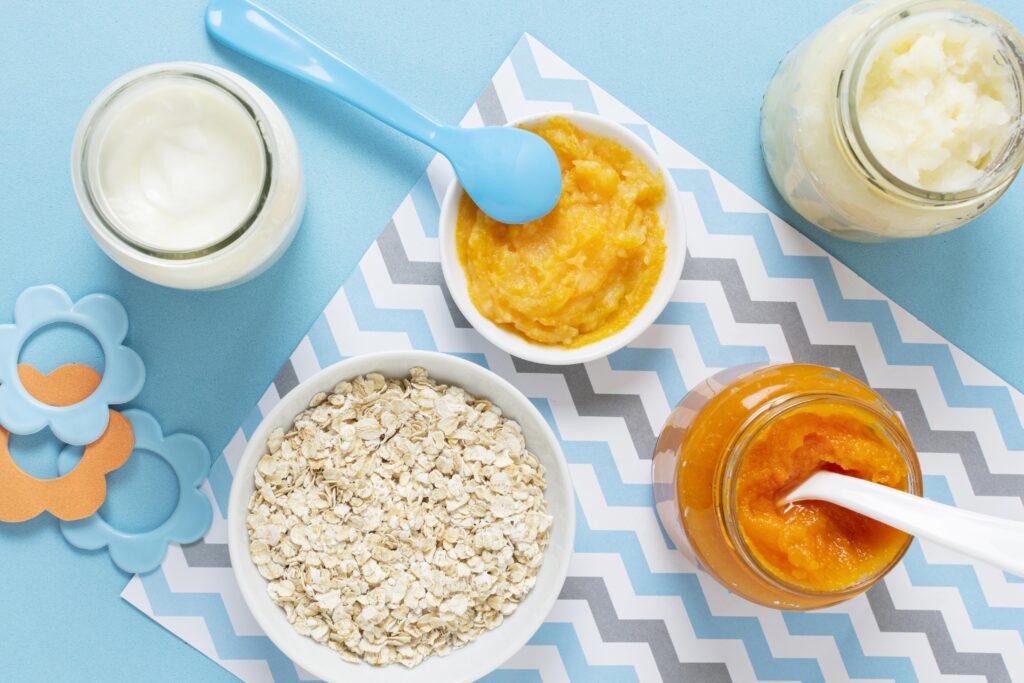Witnessing your precious bundle of joy reach the 4-month milestone is an exciting experience. As your little one becomes curious about their surroundings, displaying newfound energy and enthusiasm, you may find yourself pondering the ideal time to embark on the exciting journey of introducing solid foods. This pivotal stage not only marks a significant developmental leap but also presents an opportune moment to foster healthy eating habits that will shape your child’s relationship with nourishment for years to come. Here explaining top 10 nutritious baby food options for your 4 months old charm.

Deciphering the Signs: Is Your Baby Ready for Solid Foods?
While most healthcare professionals recommend waiting until the 6-month mark to introduce solid foods, some infants may show signs of readiness as early as 4 months. Recognizing these cues is crucial to ensuring a smooth transition. Keep an eye out for the following indications that your little one is prepared to explore the world of flavors and textures beyond breast milk or infant formula:
- Head Control: Your baby can comfortably hold their head up without assistance, demonstrating the necessary muscular strength and coordination for swallowing solid foods.
- Sitting Posture: Your little one can sit upright with minimal support, enabling them to maintain a safe and comfortable position during mealtimes.
- Interest in Food: Your baby’s gaze follows your every bite, and they may even attempt to reach for your plate, signaling an innate curiosity about solid foods.
- Diminished Tongue-Thrust Reflex: The natural reflex that causes babies to push solid objects out of their mouths with their tongues has subsided, allowing them to accept and swallow solid foods more easily.
It’s important to note that every infant develops at their own unique pace. If your baby exhibits these signs before or after the 4-month mark, it’s best to consult with your pediatrician for personalized guidance.
A Nutritious Start: Top 10 Baby Food Ideas for 4-Month-Olds
Introducing solid foods to your little one’s diet is an exciting milestone, but it’s essential to choose nutrient-dense options that are gentle on their delicate digestive system. Here are ten delectable and nourishing baby food ideas to kick-start your culinary adventure:
1. Baby Cereal
Fortified baby cereals, particularly those made from rice or oatmeal, are often recommended as an ideal first food for infants. These cereals are easy to digest and can be prepared with breast milk or infant formula, providing a familiar taste and texture for your little one.
2. Avocado
Avocados are a powerhouse of nutrients, offering a creamy texture and a mild flavor that many babies find appealing. Simply mash or puree the ripe flesh and thin it out with breast milk or formula for a smooth consistency.
3. Banana
Nature’s perfect food, bananas are rich in potassium, fiber, and natural sweetness that can delight your baby’s taste buds. Mash or puree the ripe fruit and consider thinning it with a bit of breast milk or formula for a smoother texture.
4. Butternut Squash
Butternut squash’s velvety texture and mild flavor make it an excellent choice for introducing your little one to solid foods. Bake or steam the squash until tender, then mash or puree it for a delightful baby-friendly meal.

5. Sweet Potato
Sweet potatoes are not only packed with essential vitamins and minerals but also boast a natural sweetness that can appeal to your baby’s developing palate. Boil or bake the sweet potatoes until soft, then mash or puree them for a delightful puree.
6. Carrots
Carrots are a vibrant and nutritious addition to your baby’s diet, providing a gentle introduction to the world of vegetables. Bake or steam carrots until tender, then puree or mash them for a flavorful and nutrient-dense meal.
7. Apple
With your pediatrician’s approval, cooked apples can be a delightful treat for your little one. Dice and steam or simmer the apples until tender, then puree or mash them for a naturally sweet and nutritious puree.
8. Pear
Pears are not only gentle on tiny tummies but also boast a low risk of allergic reactions, making them an excellent choice for introducing new flavors. Steam or poach ripe pears until soft, then puree or mash them for a delightful baby-friendly treat.
9. Breast Milk or Infant Formula
At this stage, breast milk or infant formula should remain the primary source of nutrition for your little one. It’s essential to consult with your pediatrician before introducing any dairy products or plant-based milk alternatives.
10. Peas
Packed with fiber and protein, peas make an excellent first vegetable for your baby. Steam or boil fresh or frozen peas until tender, then puree or mash them, adding a bit of cooking liquid or breast milk to achieve the desired consistency.
Remember, every baby is unique, and it’s essential to introduce new foods gradually, watching for any signs of allergies or intolerance’s. Consult with your pediatrician for personalized guidance on the best solid food options for your little one.
Fostering Healthy Habits: Responsive Feeding and Beyond
Introducing solid foods to your 4-month-old is not just about providing nourishment; it’s also an opportunity to foster healthy eating habits that will serve your child throughout their life. One of the most effective approaches to achieving this is through responsive feeding, a term used to describe a feeding style that emphasizes recognizing and responding to your baby’s hunger and fullness cues.
Understanding Hunger and Fullness Cues

Before delving into responsive feeding, it’s essential to understand the various cues your baby may exhibit to indicate hunger or fullness. These cues can vary depending on your baby’s age and development, but here are some common signs to watch for:
Hunger Cues:
- Rooting or turning their head toward your breast or bottle
- Sucking on their hands or fists
- Becoming increasingly fussy or irritable
- Opening their mouth or making sucking motions
Fullness Cues:
- Turning their head away from the spoon or bottle
- Pushing the spoon or bottle away
- Clamping their mouth shut or refusing to open it
- Losing interest in the food or becoming distracted
As you navigate the exciting and sometimes challenging journey of introducing solid foods to your 4-month-old, remember that every baby is unique, and their journey may unfold at a different pace. By remaining patient, responsive, and committed to fostering healthy eating habits, you can create a positive and nurturing environment that promotes a lifelong love for diverse and nutritious foods.

Embrace the joy of watching your little one explore new flavors and textures, and celebrate each milestone, whether it’s their first taste of a new vegetable or their mastery of self-feeding. Remember, this is just the beginning of a lifelong adventure with food, and the foundation you lay now will shape your relationship with nourishment for years to come.
Trust your instincts, seek guidance from healthcare professionals when needed. And most importantly, savor the precious moments of bonding and discovery that come with introducing your little one to the wonderful world of solid foods.







